Key takeaways:
- A food diary reveals patterns in eating habits and emotional triggers, helping individuals understand the relationship between food and emotions.
- Key benefits include increased mindfulness, accountability, and enhanced nutritional awareness, leading to healthier eating habits.
- Long-term benefits encompass improved energy levels, a healthier relationship with food, and greater overall well-being through awareness of holistic health factors.
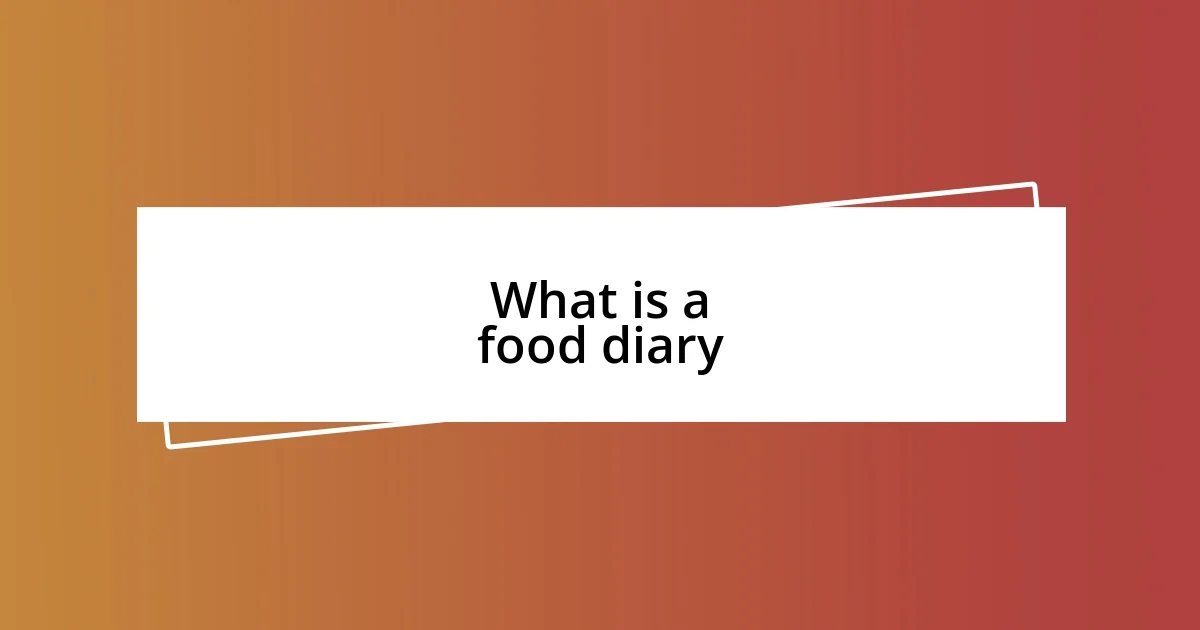
What is a food diary
A food diary is essentially a record of everything you eat and drink over a specific period. It’s like creating a map of your eating habits, which can help you get a clearer picture of your nutritional intake and patterns. Have you ever found yourself wondering why you crave certain foods at certain times? Keeping a food diary can help uncover those very triggers by making you more mindful of your choices.
When I started my own food diary, I was surprised by how revealing it was. I noticed patterns I never paid attention to before, like how late-night snacks always coincided with a stressful day. This diary became an emotional reflection of my relationship with food, allowing me to explore not just what I ate, but why I felt driven to eat in those moments.
Tracking not just the food but also the emotions and situations surrounding meals can bring immense clarity. For instance, I learned that my indulgent dessert nights followed particularly busy days, revealing a tendency to reward myself with food. What about you? Have you ever thought about how your feelings might influence your food choices? Understanding this connection can lead to healthier eating habits and a more balanced lifestyle.
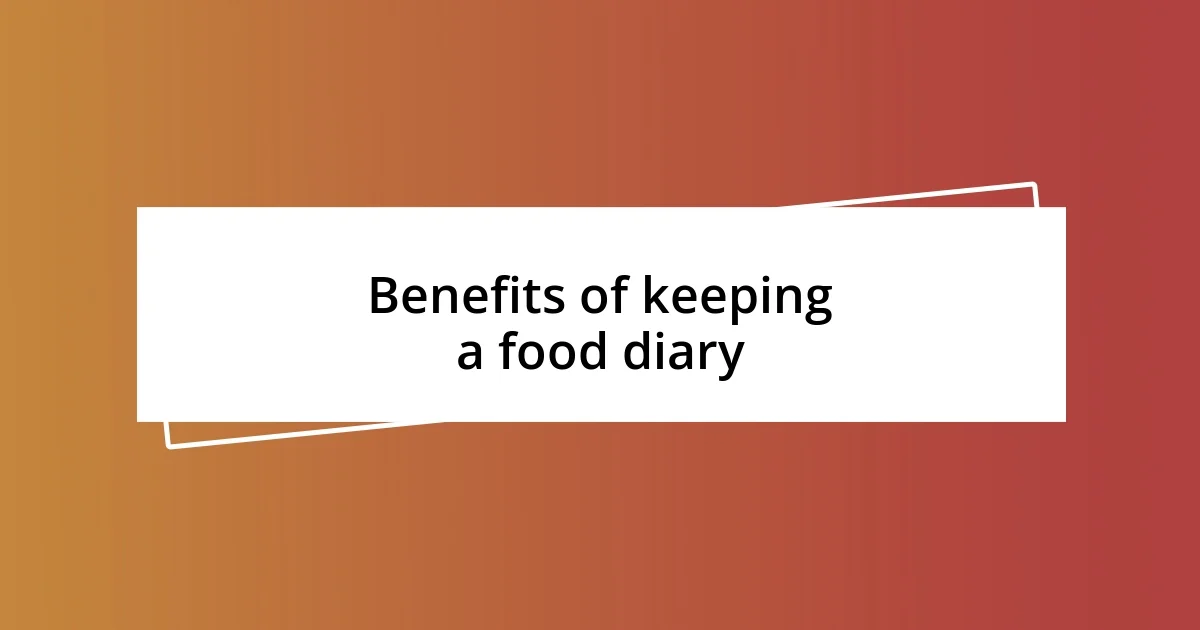
Benefits of keeping a food diary
Keeping a food diary offers a treasure trove of benefits that go far beyond just tracking what you eat. It has helped me develop awareness around my eating habits and make intentional changes. For example, jotting down not only the meals I consumed but also my mood at the time revealed surprising insights; I discovered that I often reached for comfort foods after long, tiring days. This realization inspired me to find healthier alternatives that satisfied my cravings without the guilt.
Here are some key benefits of maintaining a food diary:
- Increased Mindfulness: Writing down your meals encourages thoughtful eating, prompting you to consider what and why you consume certain foods.
- Accountability: A food diary acts as a personal check-in, keeping you honest about your choices and progress.
- Identifying Triggers: Tracking emotions and situations related to food helps pinpoint patterns that may affect your eating habits.
- Setting Goals: It can motivate you to set and track health-related goals, making it easier to celebrate small victories.
- Enhanced Nutritional Awareness: Over time, you can gain perspective on your overall diet and identify areas for improvement.
Reflecting on my own experience, I found that returning to my food diary helped strengthen my relationship with food. It wasn’t just about what I was eating; it became a powerful tool for self-discovery. I genuinely believe everyone could benefit from this practice, as it sheds light on our unique emotional connections with food, ultimately guiding us toward healthier choices.
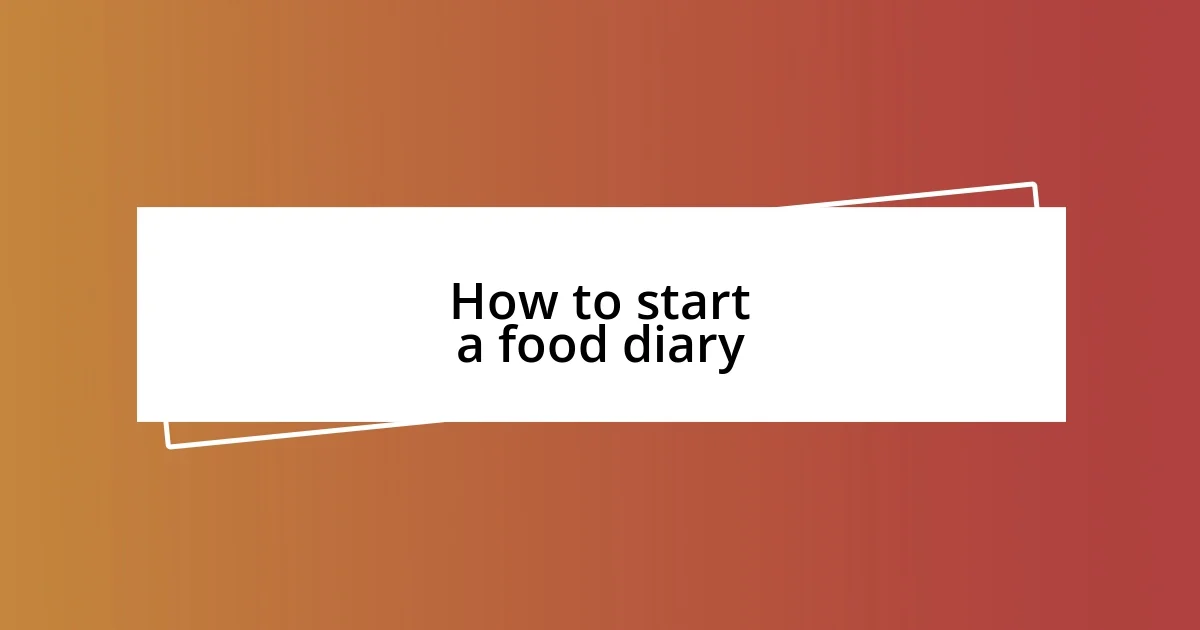
How to start a food diary
Starting a food diary can feel a bit daunting at first, but I’ve found it to be an enlightening journey. In my case, I grabbed a simple notebook and started jotting down everything I consumed, including portion sizes and times. You don’t have to be elaborate; just a few notes each day can provide incredible insights into your habits.
One of the most effective ways to kick off this practice is to set clear intentions. Ask yourself what you hope to achieve by maintaining a food diary. Whether it’s weight loss, understanding cravings, or simply fostering a healthier relationship with food, knowing your purpose can guide you. I remember when I set out to understand my emotional eating triggers; writing about my meals quickly became a daily ritual that kept me accountable and motivated.
An often-overlooked element is the emotional context of meals. Pairing your food notes with how you felt can reveal surprising correlations. For example, I started noting that I often indulged in sweets during busy work periods as a way to cope. After realizing this pattern, I began seeking out healthier stress-reducing practices. Have you thought about how your feelings could influence your eating habits? Embracing this level of awareness can transform how you approach nutrition.
| Method | Description |
|---|---|
| Notebook | Simple and tactile, perfect for those who prefer writing by hand. |
| Mobile App | Convenient and often includes features to track nutrients and calories. |
| Online Platform | Offers community support and resources for accountability. |

Key elements to track
When tracking a food diary, there are several key elements that can enhance your insights. First and foremost, portion sizes are vital; understanding how much you consume brings clarity to your eating habits. I remember the first time I visually measured my servings; it was astonishing how often I underestimated my intake. Could you imagine that realization sparking a desire to adjust my portion control? It was a game-changer for me.
Another important aspect to monitor is the times you eat. I started noting meal times alongside my food entries, and I quickly discovered a pattern: I often skipped breakfast, which led to overwhelming hunger by midday. This hunger would push me toward unhealthy options. Have you noticed how meal timing affects your cravings? By adjusting my schedule to include regular meals, I began to feel more balanced and less prone to impulse eating.
Lastly, don’t forget to track where you eat. Whether it’s at home, in a rush, or seated at your favorite café, the environment can influence your choices significantly. I’ve found that when I dine in a relaxed atmosphere, I savor my meals more and tend to make healthier options. Have you thought about how your surroundings shape your dining experiences? By documenting this, you’ll start to see the connection between environment and food preferences, enabling you to make smarter choices in the future.
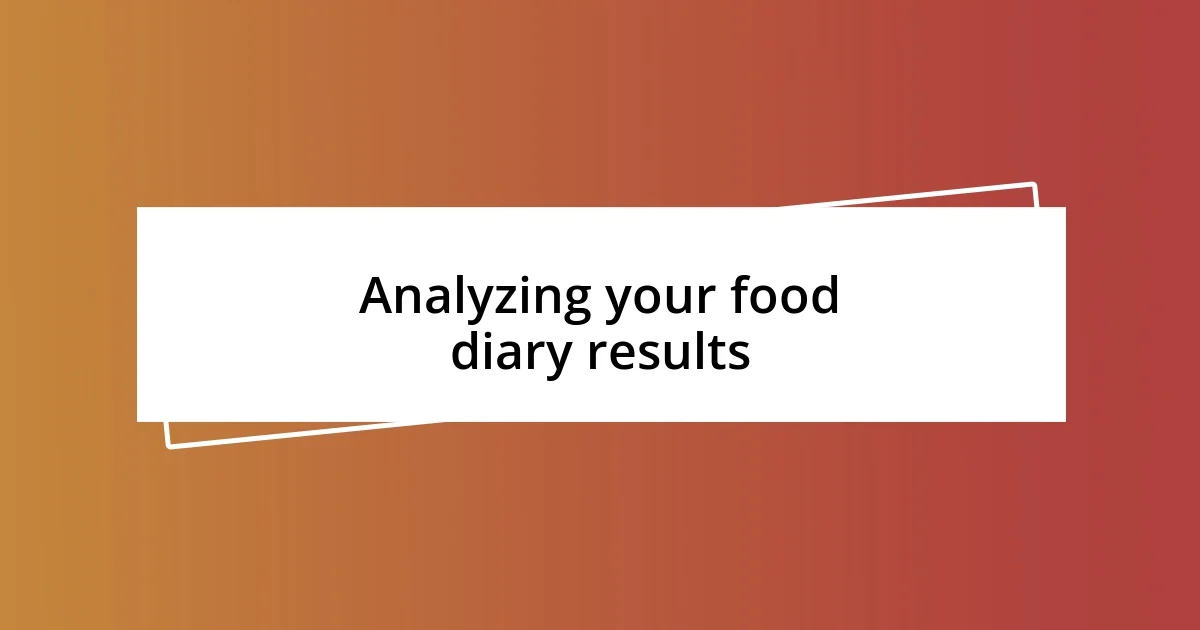
Analyzing your food diary results
Analyzing your food diary results can unveil patterns you may have never considered. I recall a moment when I reviewed my entries and saw that Fridays were consistently filled with higher calorie meals. It dawned on me that this was my reward for a long workweek. How often do we let feelings of accomplishment dictate our eating habits? Recognizing this trend helped me reframe my reward system, seeking healthier alternatives instead.
As I delved deeper, I also noticed a direct correlation between my mood and my choices. For example, I tended to reach for comfort food during stressful days. I can still remember the week I noted how often I craved carbs when anxious. This realization pushed me to explore mindfulness techniques, which have since replaced some of that emotional eating. Have you ever considered how your mental state influences your dietary decisions? By dissecting my entries, I’ve gained a clearer understanding of my triggers and motivations surrounding food.
Moreover, the time of day also revealed valuable insights. I found that late-night snacking often stemmed from boredom rather than hunger. It was a bit shocking to recognize just how much I mindlessly munched while binge-watching shows. This issue opened my eyes to the idea that not all cravings warrant food. Have you experienced similar late-night tendencies? These realizations prompted me to create healthier evening rituals that redirect my focus away from the kitchen.
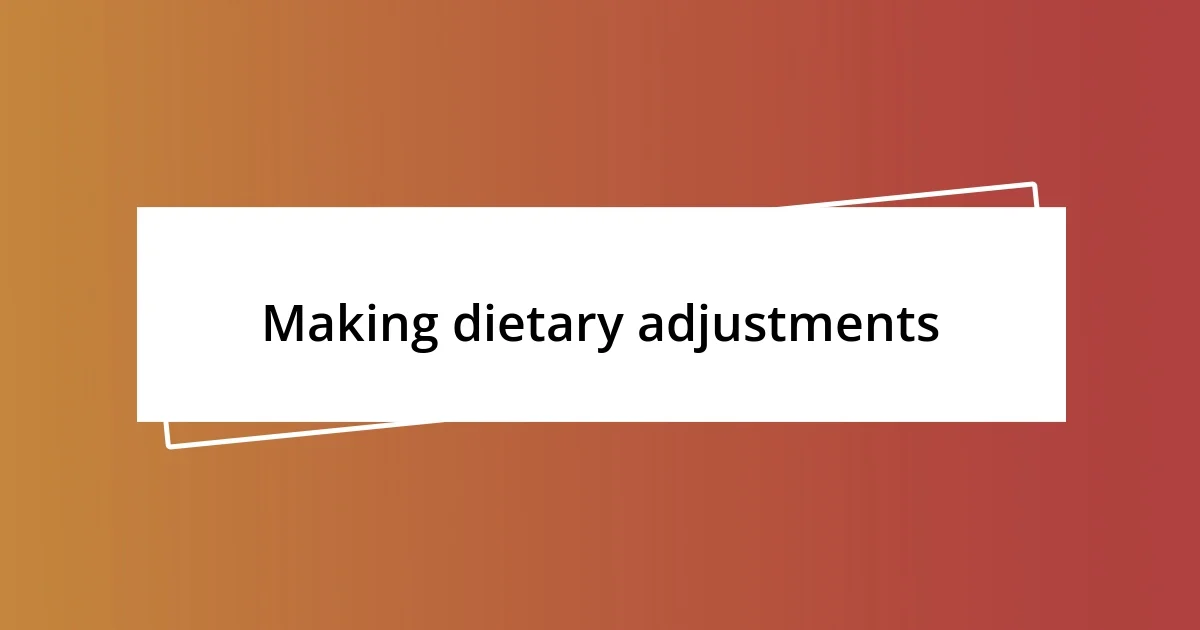
Making dietary adjustments
Making dietary adjustments often feels daunting at first, but my experience has taught me that small, manageable changes can lead to significant improvements. For instance, when I noticed a pattern of dining out excessively on weekends, I decided to challenge myself to cook at home more often. It was surprising how this simple adjustment not only improved my cooking skills but also saved me money. Have you ever thought about how home-cooked meals can shift your overall health?
Another change I embraced was the concept of swapping ingredients. One day, I stumbled across a recipe that called for whole grain pasta instead of the usual refined version I always bought. At first, I was skeptical—would it taste good? After trying it, I found that my meals were not only more nutritious but also just as satisfying. This shift encouraged me to experiment with other alternatives, like using Greek yogurt in place of sour cream. Have you tried similar ingredient swaps in your cooking?
I also learned to pay attention to my emotional connections with food. I remember catching myself reaching for a cookie after a tough day, seeking comfort rather than hunger. This realization sparked a deeper conversation with myself about finding alternative ways to cope with stress, like going for a walk or journaling. How often do we let emotions dictate our dietary choices? By recognizing this pattern, I felt empowered to cultivate healthier habits that aligned with my well-being.
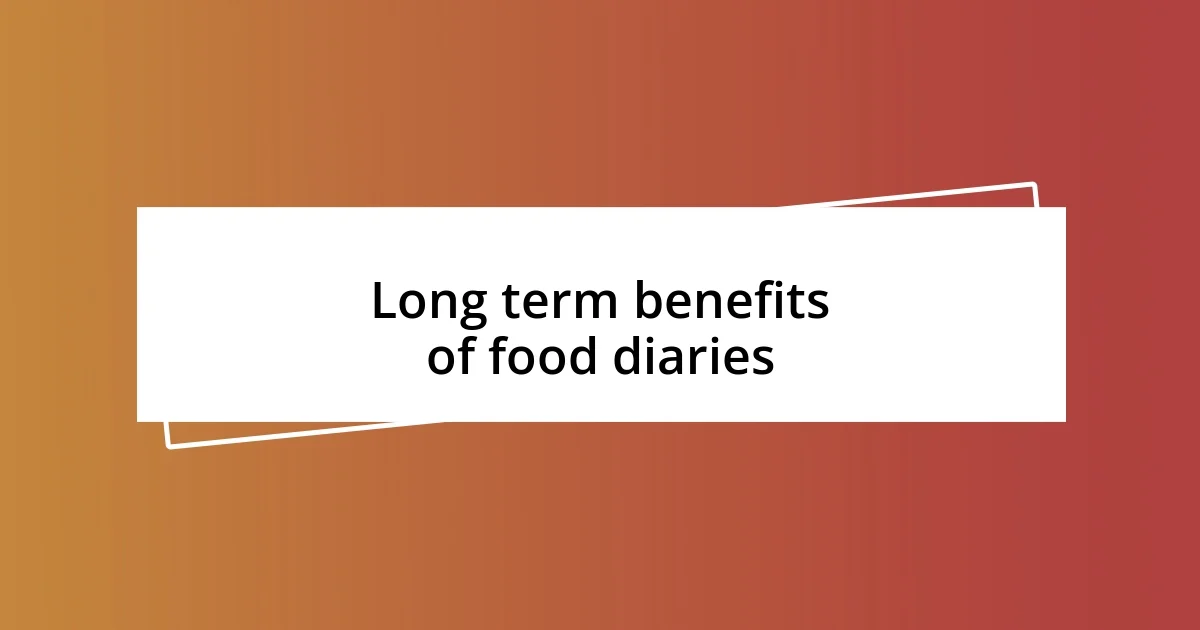
Long term benefits of food diaries
Keeping a food diary has shown me that the long-term benefits extend far beyond mere calorie counting. I remember the days when I felt lost in my eating habits, unsure of what was truly nourishing me. By consistently logging my meals, I started noticing how certain foods influenced my energy levels throughout the day. Have you ever felt that slump after an unhealthy lunch? I’ve learned that maintaining a simple record allows me to make informed choices, ultimately leading to sustained energy and better overall health.
One striking impact of my food diary was the improvement in my relationship with food itself. Initially, I viewed it as a strict regimen, but as the weeks passed, I began to see it as a tool for empowerment. Tracking my choices helped eliminate the guilt that often accompanied indulgent meals. It became liberating to acknowledge that enjoying a slice of cake didn’t mean I was off track. Have you considered how such shifts in mindset can help you steer clear of the cycle of deprivation and bingeing? For me, this newfound perspective turned the act of eating into a joyful experience rather than a source of stress.
Additionally, over time, my food diary transitioned from being solely about food to a greater awareness of my holistic health. As I reflected on my entries, I noticed an improvement in my sleep patterns and even my hydration habits. It sparked an awareness that my dietary choices ripple through various aspects of my life. How often do we overlook the interconnectedness of our habits? I found it fascinating how simply tracking what I consumed inadvertently encouraged me to drink more water and prioritize sleep, highlighting the lasting impacts of this practice on my overall well-being.












